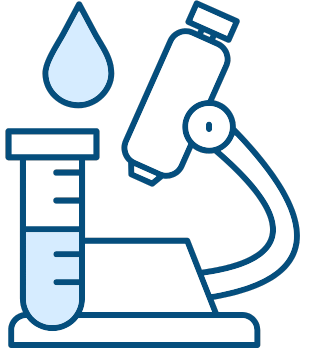Fatigue, general weakness, poor sleep and muscle cramps. Although we often don’t think about it, magnesium deficiency may be the culprit for all these discomforts. Magnesium is an extremely important mineral for our bodies, involved in a wide range of bodily functions from muscle contraction to heart rate regulation.
In this article, we will explore magnesium deficiency with Drops Clinic family doctors to understand how this mineral affects our health. We will look at the symptoms most commonly associated with a deficiency of this micronutrient. We will also discuss the main treatments and how we can ensure that our bodies are sufficiently supplied with magnesium..
Magnesium and its functions
Magnesium is one of the essential minerals for the health and functioning of the body. It is the second most abundant mineral in our bodies. Magnesium is essential for many biochemical reactions in the body, especially those that produce and use the energy the body needs.
One of magnesium’s main functions is to participate in muscle contraction. Without it, muscles could not function normally. Magnesium is also important for the heart, as it helps regulate the contraction of the heart muscles and the heart rhythm, and a deficiency of magnesium can lead to heart rhythm problems.
In addition, magnesium helps to regulate blood pressure and maintains normal blood sugar levels. It is an important antioxidant that fights free radicals in the body. The trace element helps to maintain normal immune function and contributes to the management of inflammation.
The mineral is also essential for bone health as it is involved in bone mineralisation and helps maintain normal bone structure and strength. Magnesium also has an impact on the functioning of the nervous system as it helps to reduce stress and improve sleep.
Another important role of magnesium is the regulation of carbohydrate and protein metabolism. It helps to control blood glucose levels, which is important for the prevention and treatment of diabetes. Magnesium also helps the body to absorb calcium and potassium ions.
Magnesium is an important element for health, so you should be sure to monitor your intake and ensure that your body is getting the right amount of this mineral. To maintain adequate levels of magnesium in the body, you should include magnesium-containing foods in your diet.
It is important to consult your doctor before taking magnesium supplements, as too much magnesium in the body can also cause adverse effects.
Symptoms of magnesium deficiency
- Magnesium is an important mineral that performs a variety of functions in our bodies. A magnesium deficiency can lead to a range of symptoms. The most common signs of magnesium deficiency are:
- Muscle cramps: as magnesium is important for muscle contraction and relaxation, a deficiency of magnesium can lead to muscle cramps. Sometimes muscle pain may also occur. In addition, people may experience fatigue and muscle weakness that interferes with daily activities.
- Fatigue: magnesium is essential for energy production in the body, so a deficiency can lead to fatigue and reduced energy levels.
- Difficulty sleeping: magnesium helps to regulate the nervous system, so a deficiency can lead to sleep disturbances or even insomnia.
- Heart rhythm disturbances: this mineral is important for maintaining heart health as it regulates the contractions of the heart muscles. A deficiency can lead to heart rhythm disorders such as arrhythmia. This can be a very serious problem that requires medical intervention.
- Bone weakness: magnesium is essential for bone health as it is involved in bone mineralisation. A lack of magnesium can increase the risk of osteoporosis and other bone disorders.
- Headaches: Headaches may be experienced in the case of magnesium deficiency.
- Depression and anxiety: magnesium is important for the functioning of the nervous system and a deficiency can have a negative impact on emotional health. Depression, anxiety and irritability may occur. It can also make it difficult to maintain concentration.
- Increased blood pressure: magnesium deficiency leads to increased blood pressure. This can increase the risk of cardiovascular disease.
- Changes in blood sugar levels: magnesium helps to regulate insulin activity in the body and blood sugar levels. A deficiency of this mineral can increase the risk of diabetes.
- Other symptoms: magnesium deficiency in the body can also cause other symptoms such as dizziness, loss of appetite, increased sweating, intestinal problems and increased sensitivity to noise or light.
If you experience symptoms similar to magnesium deficiency, it is essential to consult your doctor, who will be able to carry out tests and, if necessary, prescribe treatment to maintain magnesium levels in your body.
What causes magnesium deficiency?
Magnesium deficiency can be caused by a variety of factors and lifestyle factors. The main causes of magnesium deficiency are:
- Poor diet: this is one of the most common sources of magnesium deficiency. Many people do not get enough of this mineral from food, especially if their diet is not properly balanced. Magnesium can be particularly deficient in people with restricted diets (vegetarians, vegans) and in people who follow special diets or are allergic to various foods.
- Alcohol consumption: heavy alcohol consumption can reduce the amount of magnesium in the body, as alcohol stimulates the excretion of magnesium through the kidneys.
- Excessive caffeine consumption: caffeine can also contribute to the excretion of magnesium from the body. Excessive consumption of caffeinated beverages such as coffee and energy drinks can also affect the amount of magnesium in the body.
- Excessive calcium intake: Excessive calcium intake, especially from calcium supplements, can reduce the absorption of magnesium into the body.
- Medications: Some medications can increase the excretion of magnesium in the urine and cause a deficiency in the body.
- Stress: Prolonged stress and high levels of cortisol in the body can reduce magnesium intake.
- Pregnancy and lactation: Women need more magnesium during pregnancy and lactation. If the diet is not varied and balanced enough, magnesium deficiency can occur.
- Kidney disorders: The kidneys play an important role in regulating magnesium levels in the body. Various kidney diseases or disorders can lead to magnesium deficiency because the kidneys are no longer able to effectively retain the mineral in the body.
- Older age: as the body ages, its ability to absorb magnesium efficiently from food may decrease, making older people more prone to magnesium deficiency.
- Chronic diseases: some chronic diseases, such as celiac disease, and various digestive disorders can interfere with the absorption of magnesium or increase its excretion from the body.
Magnesium deficiency can cause a wide range of symptoms and adverse effects on the body. It is important to regularly check your diet and try to balance your magnesium intake with these factors and your lifestyle.
If you suspect magnesium deficiency or have symptoms, it is essential to consult your doctor to determine the exact level of magnesium deficiency and to prescribe appropriate treatment.
Treatment of magnesium deficiency
Treating magnesium deficiency can be effective in improving the condition of the body. The main ways to maintain magnesium levels in the body include:
- Intravenous therapy: an extremely fast and effective way to restore magnesium levels in the body. The drips, prescribed by qualified doctors, quickly relieve the symptoms of magnesium deficiency and improve overall health. Intravenous therapy is suitable for mild, moderate and severe magnesium deficiency. Intravenous therapy is also suitable for those who cannot absorb magnesium from food. Intravenous therapy allows direct delivery of the magnesium needed by the body, bypassing the digestive system, and its effectiveness makes it ideal for people with absorption disorders or severe magnesium deficiency. Treating magnesium deficiency with intravenous therapy is an effective way to provide the body with the magnesium it needs directly through the bloodstream.
- Magnesium supplements: magnesium supplements are one of the most popular ways to compensate for magnesium deficiency in the body. They are widely available in pharmacies and can be recommended by a doctor. It is important to follow the prescribed dosage exactly and not to exceed the daily allowance. Supplements can be very useful for those who cannot meet their magnesium needs through food, as well as for those who are prone to severe magnesium deficiency due to other health conditions.
- Magnesium-rich foods: A healthy and balanced diet is essential to avoid magnesium deficiency. Increase the variety of magnesium-rich foods in your diet. Good sources of magnesium are nuts, seeds, green leafy vegetables, cereals, bananas, fish and dark chocolate. A varied diet will help ensure that the body gets enough magnesium from natural sources.
- Avoiding factors that contribute to magnesium depletion: reduce alcohol and caffeine intake and, if possible, avoid medications that can increase magnesium excretion. If you have chronic diseases such as coeliac disease or kidney disease, treat them according to your doctor’s instructions to improve the absorption of magnesium in the body. It is also important to have regular health check-ups to quickly assess possible factors that contribute to magnesium deficiency.
- Healthy lifestyle: an active lifestyle can help improve the absorption of magnesium in the body. A healthy lifestyle also includes a regular sleep schedule and stress management, as stress can increase the release of magnesium from the body.
Magnesium deficiency can have a variety of negative effects on the body, so it is important to react to it and find ways to compensate. This is what will help prevent or reduce symptoms and improve your overall health. If you are experiencing symptoms of magnesium deficiency, it is essential to consult a doctor who, after carrying out tests, will prescribe the most appropriate treatment to maintain magnesium levels in the body.
We often don’t think about the importance of magnesium for our bodies until we experience symptoms of magnesium deficiency. If you experience fatigue, muscle cramps or other possible signs of magnesium deficiency, it’s important to see your doctor, get tested and get the right treatment.
Above all, pay attention to your body and don’t delay getting tested, as preventing magnesium deficiency and treating it in time are key to good health. If you are experiencing symptoms of magnesium deficiency, contact the Drops Clinic team. They will listen to your complaints and preferences and, after a thorough examination, prescribe the most appropriate treatment so that you can quickly enjoy good health.
Frequently asked questions
At what age are people at higher risk of magnesium deficiency?
The risk of magnesium deficiency depends on many factors, including age.
Children and adolescents, whose bodies are still growing and developing, may have a higher magnesium requirement, making them potentially vulnerable. Inadequate magnesium intake in these age groups can adversely affect growth and development.
Older people may also be at higher risk of magnesium deficiency due to several factors. As we age, the function of the digestive system may become impaired, which may interfere with the absorption of magnesium in the body. In addition, older people may be more prone to chronic diseases such as celiac disease or kidney disease, which can also interfere with magnesium absorption.
Women also have an increased need for magnesium during pregnancy, and a deficiency can have adverse effects on both mother and foetus. During pregnancy, magnesium intake and absorption from food or supplements should be carefully monitored.
However, it is important to stress that the risk of magnesium deficiency can affect people of any age, especially if they have dietary restrictions, chronic diseases or other factors that interfere with magnesium absorption. It is therefore important to monitor your diet and, if you suspect a deficiency or have related symptoms, to seek medical advice on appropriate treatment or prevention measures.
Are men or women more likely to suffer from magnesium deficiency?
Magnesium deficiency can affect both men and women, but the risk factors for magnesium deficiency vary according to individual needs and lifestyle. Certain factors can increase the risk of this condition in both sexes.
Women are more likely than men to suffer from magnesium deficiency for several reasons:
- Menstruation: menstruation can contribute to magnesium deficiency in women. During menstruation, the body may lose more magnesium. This can particularly affect women who have heavy or prolonged menstruation.
- Pregnancy and breastfeeding: pregnancy and breastfeeding are periods when the body requires more nutrients, including magnesium. If women do not balance their diet during pregnancy or lactation, a deficiency of this mineral may occur.
- Diets and eating habits: sometimes women may have certain dietary habits that reduce their magnesium intake. For example, intensive diets that are very restricted in terms of food.
- Hormonal fluctuations: hormonal fluctuations such as PMS (premenstrual syndrome) or menopause can affect magnesium levels in the body. Some studies show that hormonal fluctuations can affect the absorption of magnesium into the body.
For these reasons, women may be more susceptible to magnesium deficiency and should carefully monitor their magnesium intake. Consult a doctor if necessary.
Although women may be more susceptible to magnesium deficiency, men may also be at risk of magnesium deficiency, especially if their diet is inadequate. Also, men may exercise more intensively than women and lose magnesium through sweat.
It should be noted that every body is unique and the symptoms and risk factors for magnesium deficiency may vary. It is important to follow a balanced diet and consult a doctor if you suspect a magnesium deficiency.
What tests do I need to do to find out if I am deficient in magnesium?
Various tests can be carried out to determine whether your body is deficient in magnesium.
The main tests that can help identify a magnesium deficiency include a blood test, which measures the level of magnesium in the body, and a urine test, which can measure the magnesium concentration in the urine. An ECG (electrocardiogram) can also be performed if a magnesium deficiency is suspected, as magnesium is important for heart function. Additional tests may be carried out to find out why the body is not getting enough magnesium.
However, it is important to consider not only the tests, but also the clinical symptoms that may indicate a magnesium deficiency, such as muscle cramps, fatigue and sleep problems.
It is important to note that magnesium deficiency can only be diagnosed by a doctor. If you are experiencing symptoms that may indicate a magnesium deficiency, it is important to seek the advice of a health professional for the necessary tests and appropriate treatment.
How soon should I resume taking magnesium?
The frequency of a course of magnesium depends on several factors, including your dietary habits, physical activity, medical conditions and your doctor’s recommendations.
If your body is deficient in magnesium, your doctor can determine the appropriate dose and duration of magnesium supplements. However, in general, a renewal of the course may be recommended whenever your needs or circumstances change.
It is also important to monitor your diet regularly and choose foods containing magnesium accordingly. If a person has special needs or is prone to magnesium deficiency due to a medical condition, regular magnesium supplementation may be necessary.
However, it is important to consult a doctor before starting or resuming a course of magnesium supplements. Only he or she can determine the appropriate magnesium regimen and doses to be used, taking into account individual needs and possible health limitations. This is essential to avoid overdose or other complications that can be caused by too much magnesium in the body.




